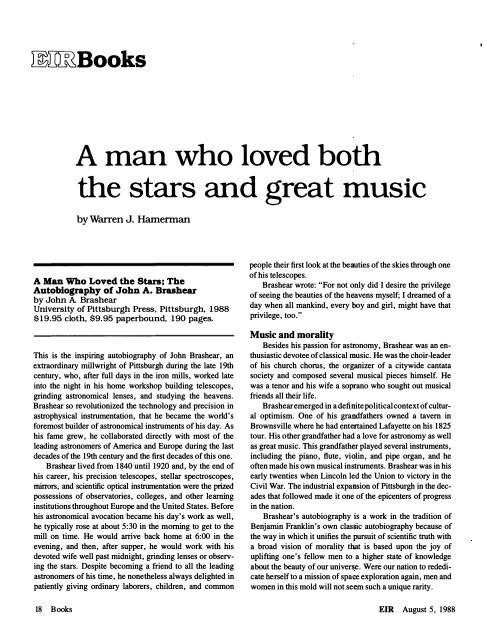View Full Issue - Executive Intelligence Review
View Full Issue - Executive Intelligence Review
View Full Issue - Executive Intelligence Review
You also want an ePaper? Increase the reach of your titles
YUMPU automatically turns print PDFs into web optimized ePapers that Google loves.
�TIillBooks<br />
A man who loved both<br />
the stars and great music<br />
by Warren J. Hamennan<br />
A Man Who Loved the Stars ; The<br />
Autobiography of John A. Brashear<br />
by John A. Brashear<br />
University of Pittsburgh Press, Pittsburgh, 1988<br />
$19.95 cloth, $9.95 paperbound, 190 pages.<br />
This is the inspiring autobiography of John Brashear, an<br />
extraordinary millwright of Pittsburgh during the late 19th<br />
century, who, after full days in the iron mills, worked late<br />
into the night in his home workshop building telescopes,<br />
grinding astronomical lenses, and studying the heavens.<br />
Brashear so revolutionized the technology and precision in<br />
astrophysical instrumentation, that he became the world's<br />
foremost builder of astronomical instruments of his day. As<br />
his fame grew, he collaborated directly with most of the<br />
leading astronomers of America and Europe during the last<br />
decades of the 19th century and the first decades of this one.<br />
Brashear lived from 1840 until 1920 and, by the end of<br />
his career, his precision telescopes, stellar spectroscopes,<br />
mirrors, and scientific optical instrumentation were the prized<br />
possessions of observatories, colleges, and other learning<br />
institutions throughout Europe and the United States. Before<br />
his astronomical avocation became his day's work as well,<br />
he typically rose at about 5:30 in the morning to get to the<br />
mill on time. He would arrive back home at 6:00 in the<br />
evening, and then, after supper, he would work with his<br />
devoted wife well past midnight, grinding lenses or observing<br />
the stars. Despite becoming a friend to all the leading<br />
astronomers of his time, he nonetheless always delighted in<br />
patiently giving ordinary laborers, children, and common<br />
18 Books<br />
people their first look at the beauties of the skies through one<br />
of his telescopes.<br />
Brashear wrote: "For not only did I desire the privilege<br />
of seeing the beauties of the heavens myself; I dreamed of a<br />
day when all mankind, every boy and girl, might have that<br />
privilege, too. "<br />
Music and morality<br />
Besides his passion for astronomy, Brashear was an en<br />
thusiastic devotee of classical music. He was the choir-leader<br />
of his church chorus, the organizer of a citywide cantata<br />
society and composed several musical pieces himself. He<br />
was a tenor and his wife a soprano who sought out musical<br />
friends all their life.<br />
Brashear emerged in a definite political context of cultur<br />
al optimism. One of his grandfathers owned a tavern in<br />
Brownsville where he had entertained Lafayette on his 1825<br />
tour. His other grandfather had a love for astronomy as well<br />
as great music. This grandfather played several instruments,<br />
including the piano, flute, violin, and pipe organ, and he<br />
often made his own musical instruments. Brashear was in his<br />
early twenties when Lincoln led the Union to victory in the<br />
Civil War. The industrial expansion of Pittsburgh in the dec<br />
ades that followed made it one of the epicenters of progress<br />
in the nation.<br />
Brashear's autobiography is a work in the tradition of<br />
Benjamin Franklin's own classic autobiography because of<br />
the way in which it unifies the pursuit of scientific truth with<br />
a broad vision of morality that is based upon the joy of<br />
uplifting one's fellow men to a higher state of knowledge<br />
about the beauty of our universe. Were our nation to rededi<br />
cate herself to a mission of space exploration again, men and<br />
women in this mold will not seem such a unique rarity .<br />
EIR August 5, 1988

















